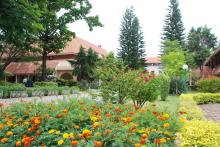
Abstract: The ‘Blue Economy’ has been defined as an ocean-dependent economic development to improve quality of life of people while ensuring inclusive social development as well as environmental and ecological security (Nayak, 2020). Oceans supply food, energy and mineral resources and are storehouses of biodiversity, influence weather and climate and provide an ecosystem for sustaining human life and other biota. The major scientific issues to be addressed for development blue economy are sustainable fisheries, conservation and preservation of coastal and marine ecosystems: Coral reefs, mangroves and sea grasses, ocean acidification, harmful algae, coastal pollution, coastal and deep-sea minerals, ocean energy, tourism, hazards and response mechanism, small islands development, shipping, industries, infrastructure. Observations of ocean from satellite and aerial platforms are critical to understand ocean processes, model and forecast weather, sea state and hazards and ensure safety of human lives and facilitate human activities. The building capacity for sustained observations is a key to understanding physics, biogeochemistry, biology and ecosystems. The idea is to develop approaches and mechanisms to promote sustainable and equitable economic development of ocean resources while ensuring a healthy ocean environment and address impacts of climate change. This is in tune with the SDG 14 and India-led global movement on Mission LiFE (Lifestyle for Environment) to protect and preserve environment. It is now certain that after 2030, when impacts of climate change are more visible, the dependence on ocean is going to increase to sustain economy and ensure livelihood. It is the need of the day to promote a “Digital Ocean” by integrating scientific data along with environmental, social and economic data to ensure ocean health and ushering blue economy. This is an opportunity to renew our commitment to the oceans, and thus of the planet Earth, for the benefit of mankind.
About the speaker: Dr. Shailesh Nayak currently is the Director of the National Institute of Advanced Studies, Bengaluru, Chancellor of the TERI School of Advanced Studies, Delhi, Editor-in-Chief of the Journal of the Indian Society of Remote Sensing (JISRS) and Life Trustee, India International Centre (IIC), New Delhi. He obtained his PhD degree in Geology from the M.S University of Baroda in 1980. He was Secretary, Ministry of Earth Sciences, during August 2008-2015, and provided leadership for programs related to earth system sciences.
He set up the state-of-the-art tsunami warning system for the Indian Ocean in 2007 and provided tsunami advisories to the Indian Ocean rim countries. He has pioneered the development of algorithms and methodologies for the application of remote sensing to the coastal and marine environment, and generated the baseline database of the Indian coast, and developed services for fishery and ocean state forecast. This coastal database has formed basis of the managing the coasts in India. He was instrumental in creating database of the glaciers of the Indian Himalaya.
